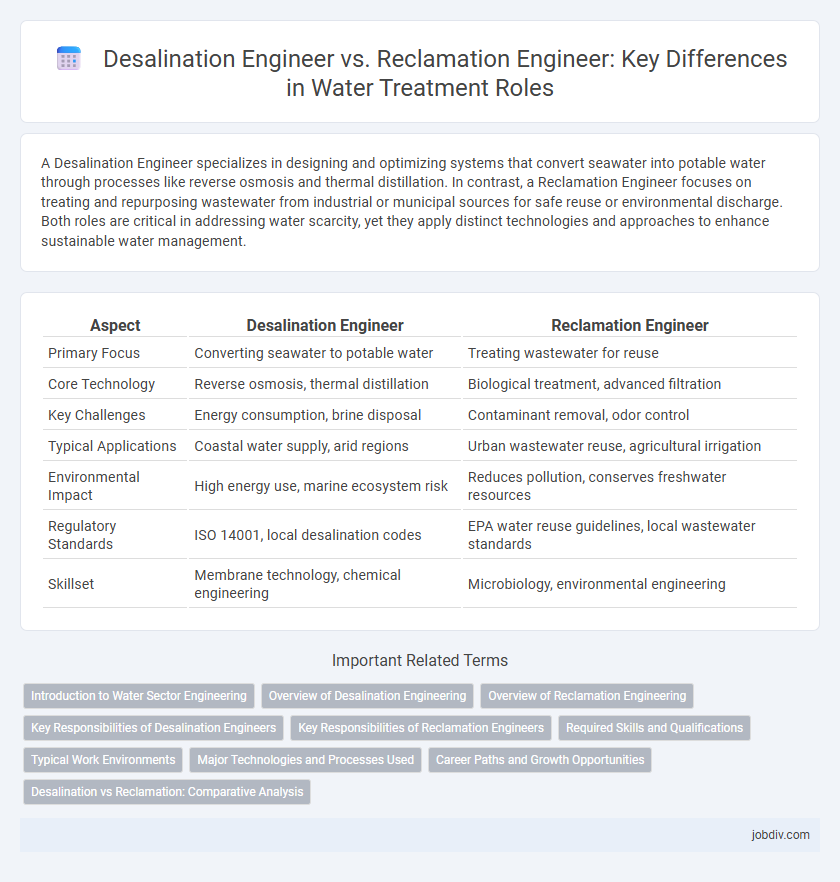A Desalination Engineer specializes in designing and optimizing systems that convert seawater into potable water through processes like reverse osmosis and thermal distillation. In contrast, a Reclamation Engineer focuses on treating and repurposing wastewater from industrial or municipal sources for safe reuse or environmental discharge. Both roles are critical in addressing water scarcity, yet they apply distinct technologies and approaches to enhance sustainable water management.
Table of Comparison
| Aspect | Desalination Engineer | Reclamation Engineer |
|---|---|---|
| Primary Focus | Converting seawater to potable water | Treating wastewater for reuse |
| Core Technology | Reverse osmosis, thermal distillation | Biological treatment, advanced filtration |
| Key Challenges | Energy consumption, brine disposal | Contaminant removal, odor control |
| Typical Applications | Coastal water supply, arid regions | Urban wastewater reuse, agricultural irrigation |
| Environmental Impact | High energy use, marine ecosystem risk | Reduces pollution, conserves freshwater resources |
| Regulatory Standards | ISO 14001, local desalination codes | EPA water reuse guidelines, local wastewater standards |
| Skillset | Membrane technology, chemical engineering | Microbiology, environmental engineering |
Introduction to Water Sector Engineering
Desalination engineers specialize in designing and managing systems that remove salt and impurities from seawater or brackish water, producing potable water for regions facing freshwater scarcity. Reclamation engineers focus on treating and recycling wastewater to restore its quality for reuse in agricultural, industrial, or environmental applications, enhancing sustainable water management. Both disciplines play critical roles in addressing global water challenges by leveraging advanced technologies to optimize resource efficiency and ensure water security.
Overview of Desalination Engineering
Desalination engineering focuses on designing and optimizing systems that convert seawater or brackish water into potable water by removing salts and impurities through processes like reverse osmosis and thermal distillation. This field requires expertise in membrane technology, energy efficiency, and corrosion-resistant materials to ensure sustainable and cost-effective freshwater production. Desalination engineers play a crucial role in addressing water scarcity by developing innovative solutions for large-scale water treatment in arid regions and coastal areas.
Overview of Reclamation Engineering
Reclamation engineering focuses on the treatment and reuse of wastewater to restore water quality for agricultural, industrial, or environmental purposes, significantly reducing freshwater demand. It involves advanced biological, chemical, and physical processes to remove contaminants and ensure compliance with regulatory standards for safe water reuse. This field supports sustainable water resource management by transforming polluted or impaired water sources into valuable assets.
Key Responsibilities of Desalination Engineers
Desalination engineers specialize in designing, operating, and maintaining systems that convert seawater or brackish water into potable water, focusing on technologies such as reverse osmosis and thermal distillation. They are responsible for optimizing membrane performance, managing energy consumption, and ensuring compliance with environmental regulations to deliver safe, high-quality freshwater. These engineers collaborate with project managers and environmental scientists to enhance system efficiency and support sustainable water supply solutions in arid regions.
Key Responsibilities of Reclamation Engineers
Reclamation engineers specialize in recovering wastewater for reuse, designing systems that treat and purify stormwater, industrial effluents, and municipal wastewater to meet environmental and safety standards. Their key responsibilities include developing advanced treatment processes, monitoring water quality to ensure compliance with regulatory guidelines, and optimizing reclamation systems for efficiency and sustainability. Unlike desalination engineers who focus on removing salt from seawater, reclamation engineers emphasize transforming contaminated water sources into reliable, reusable resources for agriculture, industrial, and potable applications.
Required Skills and Qualifications
A Desalination Engineer requires expertise in reverse osmosis, thermal desalination processes, and chemical treatment methods, with strong knowledge in membrane technology and system optimization. A Reclamation Engineer needs skills in wastewater treatment, resource recovery, and environmental compliance, emphasizing biological and mechanical treatment technologies. Both roles usually demand a degree in environmental or chemical engineering, proficiency in water quality analysis, and experience with regulatory standards.
Typical Work Environments
Desalination engineers primarily work in coastal facilities where seawater is converted into potable water using processes like reverse osmosis, often stationed in marine or industrial sites. Reclamation engineers typically operate within municipal wastewater treatment plants or industrial water recycling centers, focusing on treating and repurposing contaminated or greywater. Both roles demand expertise in water treatment technologies but differ significantly in their environmental settings and source water types.
Major Technologies and Processes Used
Desalination engineers specialize in technologies such as reverse osmosis, multi-stage flash distillation, and electrodialysis to remove salts and impurities from seawater or brackish water, focusing on membrane filtration and thermal processes. Reclamation engineers employ advanced wastewater treatment methods, including biological nutrient removal, membrane bioreactors, and ultraviolet disinfection, to convert wastewater into reusable water for agricultural, industrial, or potable applications. Both roles require expertise in process control, system optimization, and water quality standards to ensure efficient and sustainable water treatment solutions.
Career Paths and Growth Opportunities
Desalination engineers specialize in designing and optimizing systems that convert seawater into potable water, focusing on technologies like reverse osmosis and thermal distillation, with career growth often linked to advancements in renewable energy integration and large-scale infrastructure projects. Reclamation engineers concentrate on wastewater treatment and reuse, developing innovative solutions to enhance water quality for agricultural, industrial, or municipal reuse, with opportunities expanding due to increasing environmental regulations and sustainability initiatives. Both career paths offer strong growth potential driven by global water scarcity challenges but differ in technical focus and industry applications, impacting long-term specialization and project involvement.
Desalination vs Reclamation: Comparative Analysis
Desalination engineers specialize in technologies that remove salt and minerals from seawater or brackish water to produce potable water, utilizing processes such as reverse osmosis and thermal distillation. Reclamation engineers focus on treating wastewater for reuse by removing contaminants through advanced filtration, biological treatment, and chemical processes to restore water quality for agricultural, industrial, or potable applications. The key difference lies in feedwater source and treatment goals, with desalination targeting saline water and reclamation emphasizing wastewater treatment and reuse sustainability.
Desalination Engineer vs Reclamation Engineer Infographic

 jobdiv.com
jobdiv.com